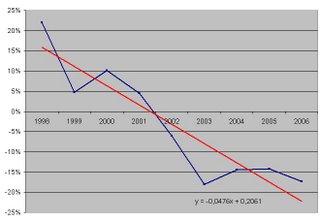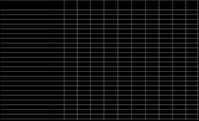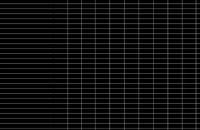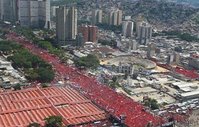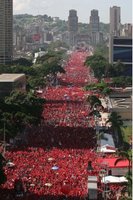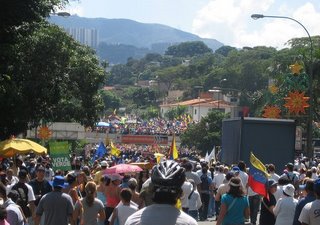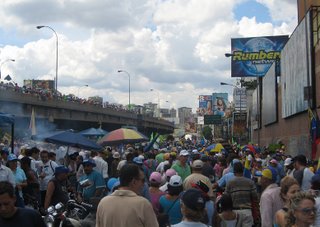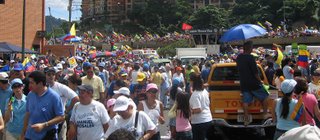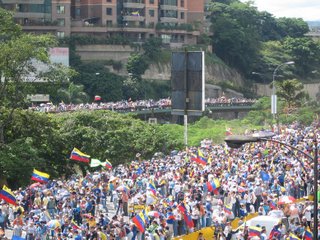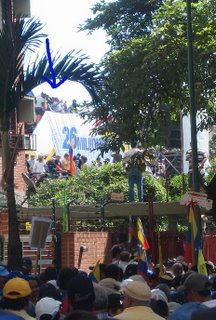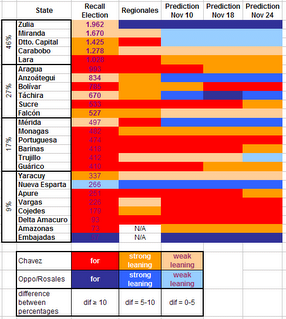---------------
Lo vamos a escribir
Milagros Socorro, El Nacional, Thursday 30, November
Por hábito, casi por poner mi cabeza en otra cosa que no sea este nudo en el pecho, me pregunto qué pensarán los observadores internacionales y la prensa extranjera cuando oyen a Chávez vociferar en plaza pública que los resultados del 3 de diciembre ya están escritos.
Me entrego a este ejercicio porque la ira es más llevadera que la sensación de que nuestro destino pende de un hilo, del resultado de dos candidaturas que no sólo expresan maneras opuestas de encaminar al país, sino que a esta hora se perciben muy parejas en su oportunidad de hacerse con el poder... o retenerlo, para desgracia de la República. Vuelvo a leer la reseña del discurso de Chávez en la avenida Bolívar y me esfuerzo en adivinar qué interpretación hacen los distinguidos visitantes de una declaración que tan cabalmente retrata a quien la profiere y que tan a las claras muestra su determinación de deshilachar el ritual electoral, de terminar de abatir la escasa confianza de los electores en el CNE y de reforzar su reputación de autócrata ganado para la manipulación del sufragio.
Estos años nos han enseñado mucho. Hemos aprendido, por ejemplo, que el oficio de observador consiste en practicar sólo la mitad de las acepciones del verbo observar; es decir, la de "Examinar atentamente", como dice el Diccionario de la Real Academia Española, que agrega: "Observar los síntomas de una enfermedad. Mirar con atención y recato, atisbar". Pero se guardan muy bien de atenerse a la otra mitad del significado de esa palabra, que apunta a: "Guardar y cumplir exactamente lo que se manda y ordena. Advertir, reparar". En dos platos, ellos ven, cómo no, pero callan. Y se hacen cómplices.
EN CUANTO A LA PRENSA EXTRANJERA, TAMBIÉN HEMOS APRENDIDO QUE EN BUENA MEDIDA SE COMPONE DE EXPEDICIONARIOS tras la ruta de la chivera de las ilusiones en que se ha convertido Venezuela. Muchos de los periodistas que vienen de otros países lo hacen con la intención previa de constatar en este pobre desguazadero de las utopías que todavía quedan en el mundo héroes a medio camino entre el folklore universal y la insania revolucionaria. Y no les importa nada con tal de llevarse un souvenir de la memoria, una crónica con su firma en la que quede dibujado un último dinosaurio, una cabeza disecada para el museo del tercermundismo. Si no han tenido sensibilidad e incluso piedad para ver y nombrar la tragedia de Cuba, qué puede quedar para nosotros que tenemos en la renta petrolera un taparrabos que impedirá que exhibamos las vergüenzas de la miseria y la esclavitud, como sí ocurre en la isla.
Cuando fuimos arrojados a este zanjón de la historia tuve muchas expectativas frente al sentido de la responsabilidad internacional y, mucho más, en la sensatez de la prensa extranjera, y lo que di por sentado que sería su descreimiento ante un teniente coronel que evidentemente pretendía crear la ilusión de una revolución en marcha para encubrir un régimen militar, autoritario y tan ineficiente que tendríamos que inventar otra palabra para aludir a sus destructivas chapuzas.
No tardaría en percatarme de la gran soledad de Venezuela. Muy pronto comprobaría que la frivolidad es la fuerza que mueve al mundo y que una parte de éste está muy contenta con una película de acción donde los muertos, el atraso y la demolición de los valores democráticos los pongan otros, preferiblemente los pendejos del subdesarrollo.
NO ES QUE NO DUELA. DUELE, DESESPERA Y ENCOLERIZA VER LA FALTA DE RECIPROCIDAD HACIA VENEZUELA, el país democrático que tantos muertos evitó en Centroamérica, que tanto contribuyó a la transición democrática en España, que tantos exiliados del Cono sur guareció y empleó, y, en fin, que tantos inmigrantes recibió para sumarlos, como hijos que para nuestro privilegio llegaron a ser, a la aspiración democrática que casi desde su fundación ha albergado la República. Ese regalo que dimos al mundo –y del que estamos siempre orgullosos– no ha sido correspondido en la misma medida, lo que degrada a quienes lo recibieron y ahora miran hacia otra parte para no ver los terribles asedios que aletean sobre nosotros.
Si ayer se llevaron su botín de paz y convivencia democrática, ahora se hacen los desentendidos para no quedarse sin su porción de los contratos sin licitación o donativos en dólares que el autócrata reparte con la expresa voluntad de intercambiarlos por conciencias, por silencio, por connivencia para sus crímenes, cuando no por aplausos y por insultos para la oposición y la prensa libre de Venezuela. Porque hasta eso hemos tenido que tragarnos: la altanera irrupción de políticos e intelectuales de tres al cuarto que vienen a nuestra casa a llamarnos golpistas (categoría que le cuadra al sátrapa del 92) y a enjuiciar al periodismo venezolano que ha opuesto palabras contra armas, ideas contra un poder omnímodo, reporteros contra militares; y cuyos excesos, que no niego ni atiborran el salón de mis blasones, han obedecido siempre a la determinación de plantársele a un gobierno nefasto, autoritario y ladrón, pero nunca a la meliflua intención de adularlo ni de pergeñar versiones para justificar sus desmanes y sus actos abiertamente delictivos.
LA ESCANDALOSA VISIÓN DE CHÁVEZ ANUNCIANDO QUE YA LOS RESULTADOS DEL 3D ESTÁN ESCRITOS NO DIRÁN NADA A NUESTROS ILUSTRES HUÉSPEDES, como cabe prever que tampoco lo hará la devastadora imagen de una mujer clavada a un árbol como una especie de Cristo en la era de Bill Gates, que llega al martirio arrastrada por una promesa de vivienda que no se le ha cumplido y a ver si con eso sube la apuesta del clamor en un país donde la palabra ha sido objeto de una hiperinflación y ya no vale nada. Sólo el cuerpo doliente logra balbucear algún contenido. Pero a nosotros sí tiene que decirnos mucho. Todo. Porque cualquier venezolano, por joven que sea, tiene detrás la suficiente tradición ciudadana para saber que un demócrata jamás se expresaría de esa manera. Una manera que tiene en la panza la promesa del fanfarrón que nos amenaza con arreglar unos resultados electorales a su antojo y conveniencia.
Nosotros no podemos hacernos de la vista gorda ante el anuncio de Chávez de que si gana las elecciones, aquí no habrá cabida para ningún otro proyecto que no sea la revolución bolivariana, lo que equivale a avisar que tampoco habrá espacio ni Patria para los millones de venezolanos que estamos radicalmente opuestos a ese proyecto. ¿Qué va a hacer con nosotros? ¿Nos va a sacar a rastras de nuestras casas? ¿Nos va a recluir en campos de concentración? ¿Nos va a matar? Será la única manera de reducirnos, porque debe saber Chávez que los demócratas venezolanos somos imbatibles. No hay amenaza ni peligro para nuestra integridad y vidas que nos haga dar un paso atrás en nuestro compromiso de impedir el desmantelamiento de la nación y la confiscación de nuestras libertades.
Nosotros sabemos –y el que no lo sepa todavía que se avispe– que el 3D lo va a escribir el pueblo democrático, el que no se arredra ante las fanfarronerías de un fracasado que teme a todo menos al ridículo. Y esa caligrafía del 3D será monumental porque cada voto opositor se hará por el bien de Venezuela y, de paso, por la libertad de Cuba, que se acercará más a la democracia en la medida en que su régimen pierda el apoyo del dictador legal de nuestro patio; así como por el reforzamiento de la democracia mexicana y la paz de Bolivia, Ecuador y Nicaragua.
Ante eso no puede haber miedo sino un coraje febril, loco, desbocado, que sorprenda al felón y lo desarme con el gesto irrebatible, estruendoso, liberador y refundador del civismo venezolano.
Tags:
